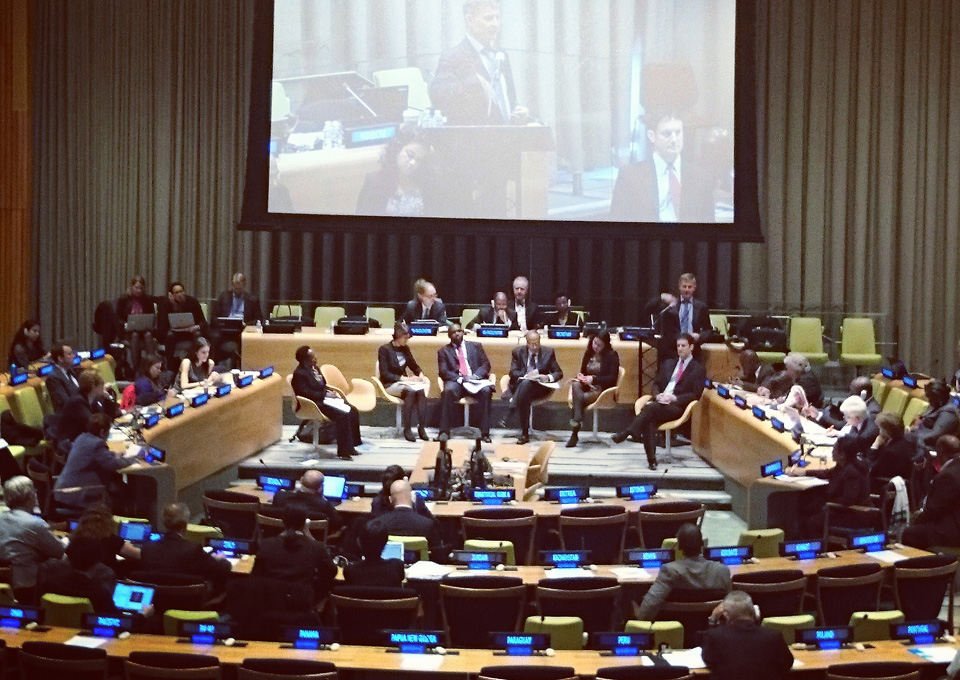
The three day long session in November was held at the Trusteeship Council at the UN Headquarters in New York, photo: Tora Systad Tyssen
Tora Systad Tyssen
Based on the Monterrey consensus from 2002 and the Doha declaration from 2008, the member countries of UN are now in the beginning of a new Financing for development process that hopefully will lead to a new document in Addis Ababa in July 2015. Fivas is working alongside a range of other civil society organizations to raise important issues in the process aiming to create a framework that contributes to sustainable growth and development.
The FFD conference in Addis will be one of three highly important meetings in the post-2015 process. Alongside the summit on the sustainability goals in New York in September and the United Nations Climate Change Conference in Paris in December, the meeting in Addis is vital to create a transformative post-2015 development agenda.
When the informal sessions started in November the main topics where domestic resource mobilization, official development assistance and private finance. In December the issues of enabling environment and systemic issues will be discussed further.
For Fivas the issue of private finance is one where we hope to contribute to influence the process by promoting sustainable and inclusive growth that contributes to lift people out of poverty. Our worry is that official development assistance will be used for blending instead of building conducive environments that are able to handle the impacts of private investments.
The statement we made read:
“We appreciate that private finance have an important role to play in creating growth. We believe it is of great importance for this UN lead process to foster inclusive growth. If economic growth is to be sustainable and to the benefit the society it is invested in, it is important that the foreign direct investments made are of high quality, are able to play to the strengths of the host country and observe human rights.
Only in this way can it contribute to real sustainable societal and environmental growth in the society as a whole because unfortunately we have yet to find a “one size fits all”-solution to creating economic growth and development, and we probably never will.
Also, foreign direct investments are by far more effective as a catalyzer for sustainable growth if it is made in a regulated framework in a country that has the capacity to handle its impact. Legal frameworks and a conducive environment are necessary for sustained and inclusive growth. A low level of law enforcement, missing political and institutional stability, corruption and poor infrastructure may not only dampen the growth-enhancing effects of foreign direct investments, but may also discourage foreign firms from investing in the first place.
We are skeptical of whether there are real sustainable developmental effects of blending and insist that it does not happen at the cost of independent efforts for capacity building and creating enabling environments.
Also, blending has to promote respect for human rights and require an adherence to human rights instruments such as the UN guiding principles on business and human rights for those businesses involved.
We are concerned that too often private investments, especially in megaprojects, lead to violations of human rights and destruction of the environment. To avoid economic activity detrimental to the environment and society and instead direct investments to a track that supports sustainable development, global common codes of conduct are needed, and reporting that follow up on these, together with effective means of legal protection and redress for states and individuals.
In addition to the UN Guiding Principles on Business and Human Rights, The OECD Guidelines for multinational companies is another leading instrument in this field agreed upon by companies, states and civil society.
We therefore recommend:
● Effective implementation of the UN Guiding Principles on Business and human Rights. Also this should apply to ODA directed towards investment.
● Effective implementation of the OECD guidelines
● Make it mandatory for all publicly listed companies to report on corporate social environmental responsibility, including through environmental responsibility integrated and country by country reporting.”
The latter recommendations on human rights are adaptions from The Norwegian Forum for Development and Environment’s position paper on the FFD process. Fivas is part of ForUM and works through the network alongside other organizations such as Save the Children, Norwegian People’s Aid and Debt Justice Network Norway with the FFD process. The full position paper can be read here.

